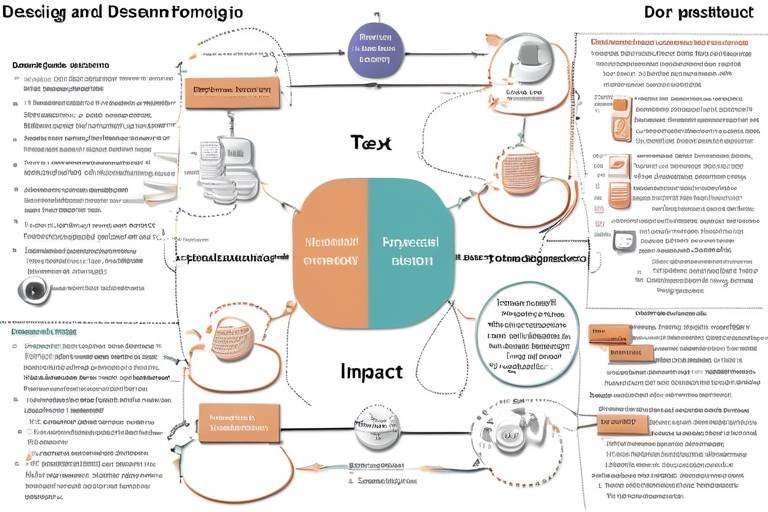How Can Ontology Influence Scientific Research?
Ontology is not just a buzzword; it’s a powerful tool that can transform the landscape of scientific research. Imagine trying to solve a complex puzzle with pieces from different boxes—this is often how researchers feel when they attempt to integrate knowledge across various disciplines. Ontology provides a structured framework that helps define the relationships and categories within a specific domain, making it easier for scientists to communicate and share their findings. By establishing a common vocabulary, ontology paves the way for clearer understanding and collaboration, which is crucial in today’s interconnected research environment.
At its core, ontology influences scientific research by enhancing the way knowledge is organized and represented. When researchers have a shared understanding of concepts, they can work together more effectively. Think of ontology as the blueprint of a building; without it, the structure would be chaotic and unstable. With ontology, researchers can build upon each other's work, leading to innovative solutions and advancements in knowledge across various fields.
Furthermore, ontology plays a vital role in data integration. In an age where big data reigns supreme, researchers often find themselves sifting through mountains of information from disparate sources. Ontology acts as a bridge, enabling the seamless combination of datasets, which in turn allows for the extraction of meaningful insights. This integration is not just beneficial; it’s essential for advancing scientific inquiry and fostering a culture of collaboration.
However, it’s important to recognize that while ontology can facilitate communication, it can also introduce challenges. Different disciplines may have their own terminologies and conceptual frameworks, which can lead to misunderstandings. It’s a bit like speaking different languages; without a translator, the message can easily get lost in translation. Thus, while ontology has the potential to enhance interdisciplinary collaboration, researchers must remain vigilant about the nuances of language and context.
In summary, ontology is a fundamental element that influences scientific research in profound ways. By providing a structured approach to knowledge representation and promoting data integration, ontology not only enhances research methodologies but also fosters innovative interdisciplinary collaborations. As we continue to explore the vast realms of science, understanding and implementing ontology will be key to unlocking new discoveries and driving the future of research.

Understanding Ontology in Science
Ontology is more than just a fancy term thrown around in academic circles; it serves as a foundational framework that shapes the very essence of scientific inquiry. Imagine trying to build a house without a blueprint—chaotic, right? Similarly, ontology provides the structure and organization needed to define concepts and categories within various scientific domains. It acts as a guide that helps researchers navigate the complex landscape of knowledge, ensuring that everyone is on the same page.
At its core, ontology helps articulate what entities exist within a particular field of study and how these entities relate to one another. For instance, in biology, ontology might define categories such as species, genus, and ecosystem, while in computer science, it could delineate concepts like data, algorithms, and systems. This clarity is vital because it allows scientists to communicate effectively, share findings, and collaborate across disciplines without getting lost in translation.
Moreover, ontology is instrumental in enhancing data interoperability. Think of it as a universal language that enables researchers from different backgrounds to understand and utilize each other's data. When researchers adopt a common vocabulary, they can seamlessly integrate findings from various studies, leading to richer insights and more robust conclusions. This is particularly important in an era where data is abundant but often siloed within individual disciplines.
Let’s dive deeper into why ontology is crucial for scientific research:
- Standardization of Terminology: By establishing a common set of terms, ontology reduces ambiguity and ensures that everyone interprets findings in the same way.
- Facilitation of Knowledge Sharing: Researchers can easily share and combine data, leading to innovative solutions that might not have been possible in isolated environments.
- Improved Data Management: Ontology provides a structured approach to organizing information, making it easier to retrieve and analyze data.
In summary, ontology is not just an abstract concept; it is a vital tool for scientific research that enhances clarity, fosters collaboration, and promotes the effective sharing of knowledge. As we continue to explore the intersections of various scientific disciplines, the importance of a well-defined ontology cannot be overstated. It’s the backbone of effective communication and collaboration, paving the way for groundbreaking discoveries that can change our understanding of the world.

The Role of Ontology in Data Integration
In the vast landscape of scientific research, data integration is akin to weaving a complex tapestry where each thread represents a different dataset. Ontology plays a pivotal role in this process, acting as the framework that defines the relationships and categories of these threads, allowing researchers to combine diverse datasets seamlessly. Without ontology, the integration of data from various sources would be like trying to fit puzzle pieces from different puzzles together—frustrating and often impossible.
At its core, ontology provides a common vocabulary that ensures all researchers are speaking the same language. Imagine attending a global conference where everyone speaks a different dialect; communication would be chaotic. However, with ontology, terms and concepts are standardized, enabling scientists from different disciplines to collaborate effectively. This uniformity is crucial in fields such as bioinformatics, where data from genomics, proteomics, and metabolomics must be integrated to draw meaningful conclusions.
Moreover, ontology enhances data interoperability by establishing clear definitions and relationships between concepts. For instance, consider a scenario where two researchers are studying the impact of a particular drug on heart disease. One researcher might focus on patient outcomes, while the other might analyze biochemical markers. Through ontology, both researchers can align their data structures, ensuring that their findings can be integrated and compared effectively. This alignment not only streamlines the research process but also enriches the overall understanding of the subject matter.
To illustrate the impact of ontology on data integration, let's delve into a few key benefits:
- Consistency: Ontology ensures that data is consistently categorized and defined, reducing ambiguity and confusion.
- Enhanced Searchability: With a standardized vocabulary, researchers can easily find relevant datasets, making literature reviews and data mining more efficient.
- Facilitated Collaboration: By providing a common framework, ontology fosters collaboration across disciplines, leading to innovative solutions to complex problems.
However, it's essential to recognize that implementing ontology in data integration is not without its challenges. Researchers must invest time and resources into developing and maintaining ontologies that accurately reflect the evolving nature of their fields. Additionally, the initial setup can be daunting, requiring a deep understanding of both the domain and the intricacies of ontology itself.
In conclusion, ontology is the backbone of effective data integration in scientific research. By providing a structured framework, it empowers researchers to combine and analyze data from various sources, ultimately leading to richer insights and advancements in knowledge. As we move forward in an increasingly data-driven world, the role of ontology will only become more pronounced, shaping how we approach scientific inquiry and collaboration.

Enhancing Interdisciplinary Collaboration
In today’s fast-paced scientific landscape, the ability to collaborate across disciplines is not just a nice-to-have; it’s a necessity. Ontology plays a pivotal role in this collaborative effort by serving as a common language that transcends the barriers of individual fields. Think of ontology as a bridge connecting different islands of knowledge, where each island represents a unique discipline with its own jargon and methodologies. By standardizing terminology and concepts, ontology fosters an environment where researchers from various backgrounds can come together, share insights, and tackle complex problems more effectively.
Imagine a team of scientists working on climate change. You might have climatologists, biologists, chemists, and social scientists all contributing their expertise. Without a shared understanding of key concepts—like "carbon footprint" or "ecosystem resilience"—communication can break down, leading to misunderstandings and missed opportunities for innovative solutions. This is where ontology shines. By providing a structured framework for defining these terms, ontology allows for seamless dialogue and collaboration among researchers. It’s like having a universal translator that ensures everyone is on the same page, regardless of their disciplinary background.
Moreover, ontology enhances collaboration by making data more accessible and interoperable. When researchers utilize a common ontology, they can easily share datasets and findings, which is crucial for interdisciplinary projects that rely on diverse data sources. For instance, a biologist studying the impacts of pollution on marine life can collaborate with a data scientist who specializes in big data analytics. By using a shared ontology, they can integrate their work, analyze the data together, and derive insights that neither could achieve alone.
However, the benefits of ontology in enhancing interdisciplinary collaboration go beyond just communication and data sharing. It also encourages a culture of innovation. When researchers from different fields collaborate, they bring unique perspectives and methodologies to the table. This diversity of thought can lead to groundbreaking discoveries that push the boundaries of what we know. For example, the intersection of biology and computer science has given rise to bioinformatics, a field that has revolutionized our understanding of genetic data.
In summary, ontology is a powerful tool that enhances interdisciplinary collaboration by:
- Standardizing terminology and concepts for better communication.
- Facilitating data integration and sharing across diverse fields.
- Encouraging innovative solutions through diverse perspectives.
As we continue to face complex global challenges, the importance of ontology in fostering collaboration among scientists will only grow. By breaking down silos and promoting a common understanding, ontology not only enhances research outcomes but also accelerates the pace of scientific discovery.

Case Studies in Interdisciplinary Research
When we delve into the world of interdisciplinary research, it’s fascinating to see how ontology has played a pivotal role in bridging gaps between various scientific domains. One standout example is the collaboration between biologists and computer scientists in the field of genomics. Here, the use of a shared ontology has allowed researchers to align genetic data with computational models, leading to groundbreaking discoveries in personalized medicine. By establishing a common language, these disciplines have been able to communicate complex ideas more effectively, resulting in innovative solutions that would have been impossible in isolation.
Another compelling case study can be found in environmental science, where ecologists and urban planners have come together to tackle issues of urbanization and biodiversity loss. The development of ontologies that encompass both ecological metrics and urban development parameters has enabled these professionals to create more sustainable cities. For instance, by using a shared framework, they can assess the impact of urban expansion on local ecosystems, ensuring that both nature and human needs are considered in planning processes.
In the realm of healthcare, the integration of ontological frameworks has transformed how patient data is utilized across disciplines. For example, the Fast Healthcare Interoperability Resources (FHIR) standard employs ontology to facilitate the sharing of patient information among healthcare providers, researchers, and insurers. This harmonization of data not only enhances patient care but also accelerates clinical research by allowing for the aggregation of vast datasets from different sources.
These case studies highlight the undeniable impact that ontology has on interdisciplinary research. However, it’s essential to recognize that the journey isn’t always smooth. The initial phase of developing a shared ontology can be fraught with challenges, such as differing terminologies and conceptual frameworks. Yet, the long-term benefits—like enhanced communication, improved data integration, and innovative solutions—far outweigh these hurdles.
As we look to the future, the lessons learned from these case studies can guide new collaborations across various fields. By fostering a culture of shared understanding and mutual respect, researchers can leverage ontology to unlock even greater potential in scientific inquiry.
- What is ontology in scientific research? Ontology refers to a structured framework that defines the concepts and categories within a specific domain, influencing how knowledge is organized and communicated.
- How does ontology enhance data integration? By providing a common vocabulary and structure, ontology allows researchers to effectively combine datasets from diverse sources, leading to more comprehensive insights.
- What are the challenges of using ontology in interdisciplinary research? Differing terminologies and conceptual frameworks can lead to misunderstandings among researchers, making effective communication challenging.
- Can ontology improve research methodologies? Yes, implementing ontology in research methodologies enhances the rigor and reproducibility of studies, enabling clearer hypotheses and structured data analysis.

Challenges in Interdisciplinary Communication
Interdisciplinary communication is often touted as the golden key to unlocking innovative solutions in scientific research. However, this ideal is frequently hindered by a variety of challenges that can create barriers between disciplines. One of the primary issues is the existence of differing terminologies. Each field has its own set of jargon and conceptual frameworks, which can lead to significant misunderstandings. Imagine trying to solve a puzzle where each piece comes from a different box; without a common understanding, the picture remains incomplete.
Moreover, the complexity of scientific concepts can further complicate communication. Researchers from various backgrounds may interpret the same term in vastly different ways. For instance, the word "model" can refer to a theoretical framework in one discipline, while in another, it might denote a physical representation. This divergence can cause confusion and hinder effective collaboration.
Another challenge is the cultural differences inherent in various scientific fields. Each discipline has its own norms, values, and practices that shape how research is conducted and communicated. For example, the fast-paced world of technology may prioritize rapid results and innovation, while the social sciences may emphasize thoroughness and ethical considerations. These contrasting approaches can lead to frustrations and misalignments when teams from different backgrounds attempt to work together.
Additionally, the lack of standardized protocols for sharing data and findings can create further obstacles. Without a universal framework, researchers may struggle to integrate their work with that of others. This is particularly evident in fields like environmental science, where data from biology, chemistry, and geology must be synthesized to address complex issues like climate change. The absence of a common language can stifle the flow of information, making it difficult to leverage collective knowledge.
To navigate these challenges, it is essential for researchers to engage in active dialogue and be open to learning from one another. Establishing a shared vocabulary and developing mutual respect for each discipline's methodologies can pave the way for more fruitful collaborations. Furthermore, workshops and interdisciplinary conferences can serve as platforms for fostering understanding and building relationships among scientists from diverse fields.
In summary, while the potential for interdisciplinary collaboration is immense, it is crucial to address the challenges that accompany it. By recognizing and actively working to overcome these barriers, researchers can enhance communication, foster innovation, and ultimately advance scientific knowledge.
- What is ontology in the context of scientific research? Ontology refers to the structured framework that defines concepts and categories within a specific domain, influencing how knowledge is organized and communicated.
- How does ontology facilitate data integration? By providing a common vocabulary and structure, ontology allows researchers to combine datasets from different sources effectively, leading to more meaningful insights.
- What are some examples of challenges in interdisciplinary communication? Challenges include differing terminologies, cultural differences between disciplines, and the lack of standardized protocols for data sharing.
- How can researchers improve communication across disciplines? Engaging in active dialogue, establishing a shared vocabulary, and participating in interdisciplinary workshops can help improve communication and collaboration.

Improving Research Methodologies
In the ever-evolving landscape of scientific research, ontology emerges as a powerful ally in enhancing research methodologies. Imagine trying to assemble a complex puzzle with pieces that don’t quite fit together; that’s how chaotic research can be without a structured framework. By implementing ontological principles, researchers can create a clearer and more organized approach to their studies. This not only improves the rigor of scientific inquiry but also ensures that the findings are reproducible and reliable.
One of the primary benefits of ontology in research methodologies is the establishment of a standardized vocabulary. When researchers across various disciplines adopt a common lexicon, it reduces the ambiguity that often clouds scientific communication. For instance, consider how different fields might describe the same phenomenon using different terms. By utilizing ontology, a term like "cell" can be precisely defined within the context of biology, medicine, or even artificial intelligence, ensuring that everyone is on the same page.
Moreover, ontology facilitates structured data analysis. It allows researchers to categorize and relate their data systematically, which is crucial for hypothesis generation and testing. By defining relationships between various concepts, ontology creates a roadmap that guides researchers through their investigations. This structured approach not only aids in clarity but also in the identification of patterns and trends that may otherwise go unnoticed.
To illustrate this point, let’s take a look at a simple table that outlines how ontology can impact different stages of the research process:
| Research Stage | Traditional Approach | Ontology-Enhanced Approach |
|---|---|---|
| Data Collection | Varied terminology leads to confusion. | Standardized vocabulary ensures consistency. |
| Data Analysis | Ad hoc methods can yield inconsistent results. | Structured relationships facilitate comprehensive analysis. |
| Hypothesis Testing | Ambiguous definitions can mislead conclusions. | Clear definitions enhance hypothesis clarity and validity. |
Furthermore, ontology encourages collaboration among researchers from diverse fields. When everyone uses the same definitions and structures, it becomes much easier to share insights and findings. This collaborative spirit is essential for tackling complex problems that require interdisciplinary approaches. For example, a biologist and a computer scientist working together on a health-related project can leverage ontology to ensure they’re interpreting the data in the same way, leading to innovative solutions that benefit from both fields.
However, it’s important to acknowledge that while ontology significantly improves research methodologies, it does not eliminate all challenges. Researchers must remain vigilant about the potential for misinterpretation, especially when dealing with complex systems where the relationships between concepts can be intricate. Continuous dialogue and refinement of ontological frameworks are necessary to keep pace with the rapid advancements in science.
In conclusion, the integration of ontology into research methodologies not only enhances the precision and reproducibility of scientific studies but also fosters a collaborative environment that is vital for innovation. As we move forward, embracing these structured frameworks will be essential for navigating the complexities of modern research.
- What is ontology in the context of scientific research?
Ontology refers to a systematic framework that defines concepts and categories within a specific domain, impacting how knowledge is structured and communicated. - How does ontology improve data analysis?
By providing a structured way to categorize and relate data, ontology enhances clarity and allows researchers to identify patterns more effectively. - Can ontology help in interdisciplinary research?
Yes, ontology standardizes terminology and concepts, which promotes better communication and collaboration among researchers from different fields. - What challenges does ontology present?
While ontology improves communication, differing terminologies and conceptual frameworks can sometimes lead to misunderstandings among researchers.

Ontology and Knowledge Representation
Ontology plays a crucial role in knowledge representation, acting as the backbone that allows scientists to model complex systems and relationships effectively. Imagine trying to build a house without a blueprint; it would be chaotic and likely lead to a structure that collapses under its own weight. Similarly, in scientific research, ontology provides that essential framework, helping researchers define and organize their knowledge in a way that is both understandable and usable.
At its core, ontology helps in the categorization of information. By establishing a set of defined terms and relationships, it allows scientists to create a shared understanding of their domain. This is particularly important in fields where concepts can vary dramatically between disciplines. For example, the term "cell" might mean something entirely different in biology compared to its use in computer science. Here, ontology acts as a translator, ensuring that everyone is on the same page.
Furthermore, ontology enhances the ability to generate hypotheses and test them rigorously. When researchers have a clear representation of their knowledge, they can more easily identify gaps in their understanding and formulate questions that can lead to new discoveries. This process of hypothesis generation is akin to a detective piecing together clues to solve a mystery; the clearer the clues (or knowledge), the easier it is to see the bigger picture.
In addition to aiding hypothesis generation, ontology also supports data interoperability. When different datasets are structured using a common ontology, it becomes much simpler to integrate information from various sources. This is particularly valuable in interdisciplinary research, where data from multiple fields must be combined to address complex questions. The table below illustrates how ontology facilitates data integration across different scientific domains:
| Domain | Ontology Example | Data Integration Benefit |
|---|---|---|
| Biology | Gene Ontology | Standardizes gene functions for comparative studies |
| Medicine | SNOMED CT | Enhances interoperability in electronic health records |
| Environmental Science | EnvO (Environment Ontology) | Facilitates data sharing across ecological studies |
Moreover, as we delve deeper into the realm of artificial intelligence (AI), the importance of ontology becomes even more pronounced. AI systems rely heavily on structured data to learn and make decisions. By using ontologies, these systems can better interpret the information they are fed, leading to more accurate outcomes. Think of ontology as the instruction manual for AI; without it, the machine could misinterpret data, leading to erroneous conclusions.
In conclusion, ontology is not just a theoretical concept; it is a practical tool that enhances our ability to represent knowledge accurately and effectively. As scientific inquiries become increasingly complex, the role of ontology will only grow, paving the way for groundbreaking research and innovative solutions across various fields.
- What is ontology in the context of science? Ontology is a framework that defines the concepts and categories within a specific domain, helping to structure and communicate scientific knowledge.
- How does ontology improve data integration? By providing a common vocabulary and structure, ontology allows researchers to combine datasets from different sources, leading to meaningful insights.
- Can ontology facilitate interdisciplinary collaboration? Yes, by standardizing terminology and concepts, ontology enhances communication among researchers from various fields, fostering collaborative efforts.
- What role does ontology play in artificial intelligence? Ontology is essential for knowledge representation in AI, aiding in machine learning processes and improving the accuracy of research outcomes.

Applications in Artificial Intelligence
In today's rapidly evolving technological landscape, artificial intelligence (AI) stands out as a transformative force across various sectors. One of the most significant aspects of AI is its reliance on ontology for effective knowledge representation. So, how does ontology play a role in AI? Well, ontology provides a structured framework that enables machines to understand complex data, relationships, and concepts just like humans do. This is crucial for several AI applications, including natural language processing, semantic web technologies, and machine learning.
Imagine trying to teach a computer to understand human language without a clear structure or common vocabulary. It would be like trying to navigate a maze without a map! Ontology acts as that map, allowing AI systems to interpret and process information accurately. For instance, in natural language processing, ontology helps in disambiguating terms and understanding context, leading to more accurate translations and better conversational agents.
Moreover, ontology enhances the interoperability of AI systems. By providing a common vocabulary and a set of concepts, different AI applications can work together seamlessly. This is particularly important in fields like healthcare, where AI systems from various sources must integrate and analyze patient data. The use of standardized ontologies allows for the effective sharing of information, which can lead to improved patient outcomes through more personalized treatment plans.
Another exciting application of ontology in AI is in the realm of machine learning. Here, ontology assists in feature selection and the creation of models that can learn from data more effectively. By defining the relationships between different features, researchers can build models that are not only more accurate but also easier to interpret. This is essential for fields like finance and bioinformatics, where understanding the underlying processes is as important as making predictions.
To illustrate the impact of ontology in AI, consider the following table that highlights key applications:
| Application | Description |
|---|---|
| Natural Language Processing | Improves understanding of context and semantics in human language. |
| Healthcare Analytics | Facilitates data integration and personalized medicine through standardized vocabularies. |
| Machine Learning | Aids in feature selection and model interpretability for better predictions. |
| Semantic Web | Enhances data sharing and interoperability across various web applications. |
As we look to the future, the synergy between ontology and AI is expected to grow even stronger. Researchers are exploring advanced ontological frameworks that can adapt and evolve alongside AI technologies. This means that as AI systems become more sophisticated, the ontologies that support them will also need to evolve, ensuring that they remain relevant and effective in facilitating knowledge representation.
In summary, the applications of ontology in artificial intelligence are vast and varied. From enhancing natural language processing to improving healthcare analytics and machine learning, ontology serves as the backbone of effective knowledge representation in AI. As we continue to push the boundaries of what AI can achieve, the role of ontology will undoubtedly remain pivotal in shaping the future of this exciting field.
- What is ontology in the context of AI? Ontology in AI refers to a structured framework that defines concepts and relationships within a specific domain, enabling machines to understand and process information effectively.
- How does ontology improve natural language processing? Ontology helps disambiguate terms and understand context, which leads to more accurate translations and better conversational agents.
- Can ontology enhance machine learning models? Yes, ontology assists in feature selection and model interpretability, leading to more accurate and understandable predictions.
- What are some key applications of ontology in AI? Key applications include natural language processing, healthcare analytics, machine learning, and semantic web technologies.

Future Directions in Ontological Research
As we look to the future, the landscape of ontological research is poised for significant transformation. With the rapid advancement of technology and the increasing complexity of scientific inquiries, ontology is stepping into the spotlight like never before. One of the most exciting directions is the integration of machine learning and big data analytics into ontological frameworks. These technologies can help automate the process of ontology development, allowing researchers to dynamically update and refine ontologies as new knowledge emerges. Imagine a world where ontologies evolve in real-time, adapting to the latest discoveries and insights!
Moreover, the emergence of semantic web technologies is revolutionizing how we approach ontology. By utilizing linked data principles, researchers can create ontologies that are not only more interconnected but also interoperable across various platforms and disciplines. This interconnectedness can lead to a richer tapestry of knowledge, where insights from one field can effortlessly inform another, breaking down the silos that often hinder scientific progress.
Another promising avenue is the exploration of ontologies in personalized medicine. As healthcare moves towards more tailored approaches, ontologies can play a crucial role in integrating diverse data sources—ranging from genetic information to lifestyle factors—into cohesive frameworks that enhance patient care. For instance, consider how an ontology could streamline the process of matching patients with clinical trials based on their unique profiles, ultimately leading to more effective treatments.
Furthermore, the rise of collaborative ontological development platforms is fostering a community-driven approach to ontology creation. Researchers from various fields can contribute their expertise, ensuring that the resulting ontologies are comprehensive and relevant. This collaborative spirit not only improves the quality of ontologies but also enhances interdisciplinary communication, paving the way for innovative solutions to complex problems.
However, with these advancements come challenges. As ontologies become more complex and integrated, ensuring consistency and clarity across different domains will be crucial. Researchers must remain vigilant to avoid the pitfalls of ambiguity and miscommunication that can arise from overly intricate ontological structures. This calls for ongoing dialogue among experts and a commitment to best practices in ontology development.
In conclusion, the future of ontological research is bright, filled with opportunities to enhance scientific inquiry and data management. As we continue to explore these new frontiers, the potential for ontology to shape our understanding of the world around us is boundless. Embracing these advancements will not only propel scientific research forward but also enrich our collective knowledge in ways we have yet to imagine.
- What is ontology in the context of scientific research?
Ontology refers to a formal representation of a set of concepts within a domain and the relationships between those concepts, which helps in structuring and communicating scientific knowledge.
- How does ontology facilitate data integration?
By providing a common vocabulary and structure, ontology allows researchers to combine datasets from different sources effectively, leading to more meaningful insights.
- What are some applications of ontology in artificial intelligence?
Ontology is crucial in AI for knowledge representation, which aids in machine learning processes and enhances the accuracy of AI-driven research outcomes.
Frequently Asked Questions
- What is ontology in the context of scientific research?
Ontology in scientific research refers to a structured framework that defines the concepts, categories, and relationships within a specific domain. It helps in organizing knowledge, making it easier for researchers to communicate and collaborate across different fields.
- How does ontology enhance data integration?
Ontology enhances data integration by providing a common vocabulary and structure, which allows researchers to combine datasets from various sources effectively. This leads to more meaningful insights and a comprehensive understanding of complex data.
- Can ontology improve interdisciplinary collaboration?
Absolutely! By standardizing terminology and concepts, ontology promotes clearer communication among researchers from different disciplines. This collaborative environment fosters innovative solutions to complex problems, driving advancements in scientific research.
- What are some challenges associated with ontology in interdisciplinary communication?
While ontology facilitates communication, it can also lead to misunderstandings due to differing terminologies and conceptual frameworks among researchers. These challenges can create barriers to effective collaboration if not addressed properly.
- How does ontology impact research methodologies?
Implementing ontology in research methodologies enhances the rigor and reproducibility of studies. It allows for clearer hypotheses and more structured data analysis, which are crucial for producing reliable scientific results.
- What role does ontology play in knowledge representation?
Ontology is vital for knowledge representation as it helps scientists model complex systems and relationships. This modeling aids in generating and testing hypotheses, making it easier to understand intricate scientific concepts.
- How is ontology applied in artificial intelligence?
In artificial intelligence, ontology is essential for knowledge representation, which facilitates machine learning processes. It improves the accuracy of AI-driven research outcomes by providing a structured way to understand and process information.
- What are the future directions for ontological research?
Future directions in ontological research include exploring emerging trends and technologies that could further enhance the influence of ontology on scientific inquiry and data management. This may lead to more sophisticated tools for knowledge organization and sharing.



















